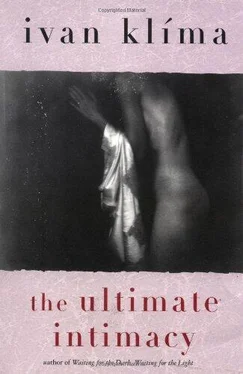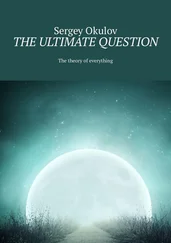Ivan Klima - The Ultimate Intimacy
Здесь есть возможность читать онлайн «Ivan Klima - The Ultimate Intimacy» весь текст электронной книги совершенно бесплатно (целиком полную версию без сокращений). В некоторых случаях можно слушать аудио, скачать через торрент в формате fb2 и присутствует краткое содержание. Год выпуска: 1998, Издательство: Grove Press, Жанр: Современная проза, на английском языке. Описание произведения, (предисловие) а так же отзывы посетителей доступны на портале библиотеки ЛибКат.
- Название:The Ultimate Intimacy
- Автор:
- Издательство:Grove Press
- Жанр:
- Год:1998
- ISBN:нет данных
- Рейтинг книги:3 / 5. Голосов: 1
-
Избранное:Добавить в избранное
- Отзывы:
-
Ваша оценка:
- 60
- 1
- 2
- 3
- 4
- 5
The Ultimate Intimacy: краткое содержание, описание и аннотация
Предлагаем к чтению аннотацию, описание, краткое содержание или предисловие (зависит от того, что написал сам автор книги «The Ultimate Intimacy»). Если вы не нашли необходимую информацию о книге — напишите в комментариях, мы постараемся отыскать её.
The Ultimate Intimacy — читать онлайн бесплатно полную книгу (весь текст) целиком
Ниже представлен текст книги, разбитый по страницам. Система сохранения места последней прочитанной страницы, позволяет с удобством читать онлайн бесплатно книгу «The Ultimate Intimacy», без необходимости каждый раз заново искать на чём Вы остановились. Поставьте закладку, и сможете в любой момент перейти на страницу, на которой закончили чтение.
Интервал:
Закладка:
Ivan Klima
The Ultimate Intimacy
Author's Foreword
The statement that any resemblance between characters in a literary work and actual persons is purely coincidental generally tempts the reader to find real-life models for fictional characters.
The hero of this novel is a Protestant pastor, as the reader will immediately realize from its opening lines, and since I have a good number of friends among the Protestant clergy, whom I esteem for their social and moral stands, I should like to assure my readers that on this occasion it would be truly pointless to seek a model for my hero among their number. The same also applies, of course, to all the other characters in the book. After a lifetime's experience of prose writing, it is my considered opinion that the most authentic people and stories are those that emerge from the authors imagination.
Chapter One
l
The light has grown dimmer in the chapel. Outside, seen through the narrow window, large flakes of March snow are falling. There are only two weeks left to Easter, so the chapel is almost full. Unless Daniel counts the three dozen or so loyal members of the congregation, people these days tend to come to church only around the traditional feast days.
'Christ,' Daniel says as he approaches the end of his sermon, crowned his work and teaching about the importance of love as the supreme expression of humanity with the most consequential of actions: he sacrificed his life for the love of people. The story of Jesus is also a message about God's new dispensation: original sin is erased. Sin brought forth evil. The penalty for sin and evil was death. Christ's death restores hope to mankind. It opens the way to good. Death is overcome and mankind is invited into God's presence.'
Reverend Daniel Vedra concludes his sermon, descends the two steps from the pulpit and sits down on a chair. His daughter Eva, the only child of his first marriage, once more takes her place at the harmonium. She plays well — very well. She has inherited his perfect pitch. The congregation on the other hand — in spite of all his efforts — sings badly, terribly in fact. Scarcely one in ten of those present has attended hymn practices.
Thine be the glory, risen, conquering Son, Endless is the victory thou o'er death hath won.
How many of them truly believe the words they are now singing? But for the minister the words have a particular significance: his mother is dying. He has spent the entire previous night at her bedside
even though she probably didn't notice him; her soul was already preparing itself for the long journey into the unknown, the journey where she would meet Him. His mother believed this fervently while she was still capable of expressing her convictions.
Angels in bright raiment rolled the stone away, Kept the folded grave-clothes, where thy body lay.
The minister looks around the gloomy chapel. He knows all of those present by name, he knows their life stories, their troubles, their jobs and the names of their children. But in the back row, at the side, an unknown woman dressed in strikingly colourful clothes has been sitting since the beginning of the service. She reminds him of Jitka, his first wife, with her long fair hair with its auburn sheen and her voice.
Jitka has been dead for almost eighteen years. Don't fret, she wrote to him several days before her death. Don't be sad. We'll meet again, won't we?
Yes, but in what form? In what form, Mummy?
Has death truly been vanquished? How long will it be before he finds out? How long before he discovers, unless there's nothing to discover at all.
No more we doubt thee, glorious Prince of Life; Life is naught without thee: aid us in our strife.
What is stronger, faith without doubts, or faith that contends with doubts? 'I'd like to believe,' one of the prisoners he used to visit twice a month told him a year ago. 'How do I go about it, vicar?'
He was a young fellow who procured drugs for himself and others. He used to steal and take drugs because he didn't want to work and because he had no one to turn to. 'Pray, Petr. Confide in Him. Tell Him everything, even the most intimate things.' That did not convince him. How can you confide in someone you don't believe exists? But then, if you start to confide in someone, they start to exist. A heretical thought. Very heretical, in fact. Six months later Petr asked to be baptized.
He stands up and mounts the pulpit. Eva briefly continues improvising on the Handel tune. With a scraping of feet, rustling of clothes and coughing, the congregation rises to join him in prayer and, through his mediation, affirm their humility, confess their guilt and
sinfulness and make supplication. Jesus, who died for us on the cross, Lamb of God sacrificed for us sinners, You who suffered that we might have eternal life, have mercy on our weakness and give us the strength to believe. Be with those who believe in you and those who do not. Be with the powerful and the powerless. Be with prisoners and also with those who rule our country. Give our rulers wisdom and humility. And abide with those who are in any way unsure of the way ahead and seek a path to You. And do not forsake, we beseech You, either the sick or those who at this time are taking leave of this life in anxiety and in hope of Your mercy.
Now the Lord's Prayer and the blessing: The blessing of our Lord Jesus Christ be with you all. Amen.
The closing hymn. He has chosen a short one. He is in a hurry and still has to take leave of each member of the congregation. He looks at them. His wife Hana is sitting in the front row in her old-fashioned Sunday clothes; beside her, their Magda, gazing at him devotedly through thick lenses.
He also notes that the unknown woman is leaving before the end of the hymn; one less to take leave of at least.
He walks up the aisle between the pews while the people wait in deference for him to leave first. The chapel is on the ground floor of a three-storey apartment house belonging to the congregation. On the first floor there is a library, an office and two guest rooms. He and his family live on the second floor. Now he stops outside the front door. A cold wind is blowing. The minister is too tall and thin, he looks as if any moment he might bend in the wind like the trees in the street. The wind can do little to dishevel the minister s already thinning hair, but it creeps under his black gown so that before long he will be chilled to the marrow. Fortunately he is used to it, having served for years in the Moravian Highlands where the cold months outnumbered the warm ones.
He grips an aged hand. 'It was very kind of you to come, Mr Houdek.'
'Why not, from time to time? It gives my wife pleasure and it does me no harm. And she is not up to it any more, much as she'd like to come. But you gave a good sermon, even for the likes of us pagans.' Mr Houdek owns a nursery that the Communists confiscated from him forty-five years ago, but he has lived to see it returned to him in his declining years. He probably does not believe in God but he occasionally comes to the service on account of his wife, who is unable to
make it here, just so that he can tell her what the sermon was about and who was at church.
'I'll drop by for a chat with your wife,' the minister promises. 'You sang splendidly, young Alois,' he says, turning to a lanky, red-headed lad. Alois used to be one of Petr's gang. He doesn't know who his father is, and his mother is in prison. He escaped a prison sentence; he didn't steal, apparendy. Or that's what he maintains, at least. He admires Petr, which is why he turned up here and why he asked to be baptized. But he strikes the minister as more sincere than Petr these days. His wife has taken to the lad too and she recently suggested that he could come and live with them; the guest rooms are hardly used and Alois would get a taste of family life for the first time. Unless it was too late.
Читать дальшеИнтервал:
Закладка:
Похожие книги на «The Ultimate Intimacy»
Представляем Вашему вниманию похожие книги на «The Ultimate Intimacy» списком для выбора. Мы отобрали схожую по названию и смыслу литературу в надежде предоставить читателям больше вариантов отыскать новые, интересные, ещё непрочитанные произведения.
Обсуждение, отзывы о книге «The Ultimate Intimacy» и просто собственные мнения читателей. Оставьте ваши комментарии, напишите, что Вы думаете о произведении, его смысле или главных героях. Укажите что конкретно понравилось, а что нет, и почему Вы так считаете.






![Theresa Cheung - The Dream Dictionary from A to Z [Revised edition] - The Ultimate A–Z to Interpret the Secrets of Your Dreams](/books/692092/theresa-cheung-the-dream-dictionary-from-a-to-z-r-thumb.webp)





